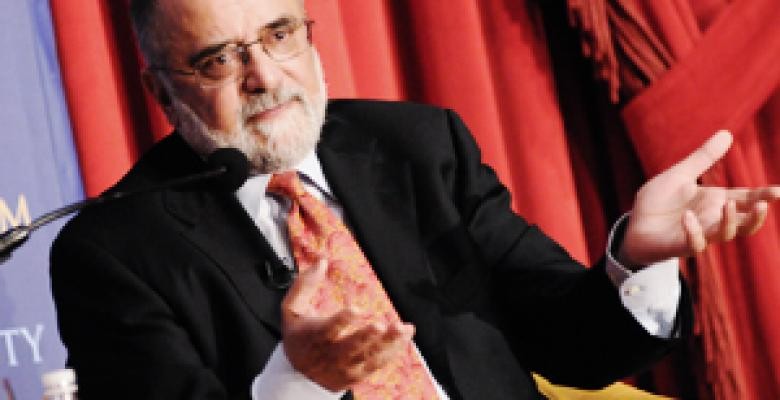World Leaders Forum Looks at U.S. Foreign Policy in Afghanistan and Pakistan

The United States faces few good choices in its dealings with Afghanistan and Pakistan, says a longtime expert in the region, and must take a “longer view” than what has been exhibited in a decade plus of conflict.
Pakistani journalist Ahmed Rashid spoke of the tenuous state of U.S. involvement in both nations at Columbia University’s World Leaders Forum on March 20.
“I’m deeply, deeply pessimistic,” said Rashid, a native of Lahore, Pakistan, who has covered that region for over 30 years. “I’ve seen one unraveling of a superpower’s involvement in Afghanistan,” he said, referring to the former Soviet Union’s nearly decade-long war in Afghanistan, a quagmire that ended with the USSR’s withdrawal in 1989. “I hope that the Americans don’t make the same mistake that the Soviets did…that you need to end this war before you leave.”
The discussion, moderated by "New Yorker" staff writer and president of the New America Foundation Steve Coll, painted a grim view of America’s current relations with both Afghanistan and Pakistan.
How and when the U.S. might leave has become an especially heated topic during the last three months. In January, the U.S. military dealt with fallout from a video showing Marines urinating on the bodies of Taliban insurgents; in February, American soldiers burned Korans at a detention center in Afghanistan, sparking outrage among Afghans and other Muslim nations; and most recently, a Marine has been accused of gunning down 17 Afghans, primarily women and children.
“We may be witnessing the start of a serious deterioration of discipline and morale in the U.S. military,” Rashid said. He worries that given the length of the war—10 years and counting—it may no longer be possible to mount an orderly withdrawal of U.S. and NATO forces.
Any orderly withdrawal must be coupled with ending the current civil war, according to Rashid, whose new book, "Pakistan on the Brink: The Future of America, Pakistan, and Afghanistan," has just been published. And talks between the Taliban and the U.S., which the Taliban broke off shortly after the Koran-burning became public, must resume.
Rashid said talks with the Taliban stalled because the Obama administration has been slow in effecting a prisoner exchange, a confidence-building exercise that would allow the Taliban to reduce their military activities as the U.S. does the same. He hopes the two sides will resume in the next few weeks.
Even so, a pullout might not stabilize Afghanistan if nothing is done to build an indigenous economy. “What’s going to happen after the withdrawal is that the economy is totally dependent on the Western intervention,” Rashid said. “Tens of thousands of Afghans are needed to service the 150,000 troops that are there and the moment these troops leave, what do these Afghans do?”
It will also be important for the U.S. to work on its relations with Pakistan. “Forget the intelligence relationship. That is not going to be restored the way it existed before,” Rashid said. “You need a real strategic dialogue with Pakistan as to how far Pakistan is willing to shift its foreign policy and what the U.S. can do to help. Not the U.S. dictating what the Pakistanis should do.”
Despite the bleak picture offered up during much of the talk, Rashid expressed hope for the region’s future. “I wouldn’t have been covering Afghanistan for 32 years if I wasn’t an optimist,” he joked. “I remain an optimist because I really believe that Afghan people have something in them that really wants, you know, a peace and a settlement.